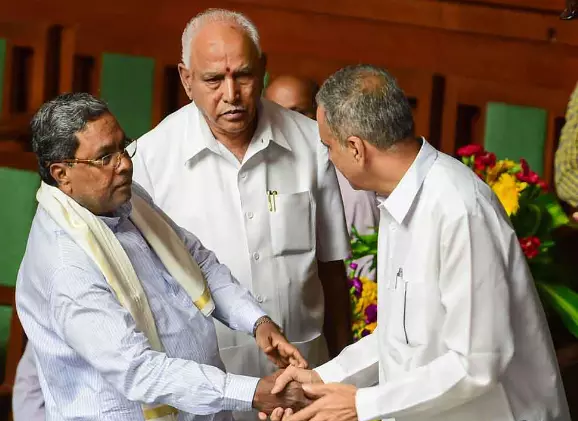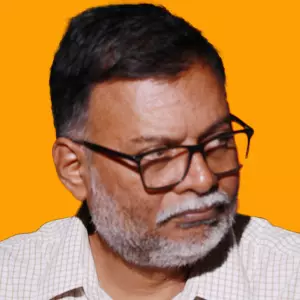
- Home
- India
- World
- Premium
- THE FEDERAL SPECIAL
- Analysis
- States
- Perspective
- Videos
- Sports
- Education
- Entertainment
- Elections
- Features
- Health
- Business
- Series
- In memoriam: Sheikh Mujibur Rahman
- Bishnoi's Men
- NEET TANGLE
- Economy Series
- Earth Day
- Kashmir’s Frozen Turbulence
- India@75
- The legend of Ramjanmabhoomi
- Liberalisation@30
- How to tame a dragon
- Celebrating biodiversity
- Farm Matters
- 50 days of solitude
- Bringing Migrants Home
- Budget 2020
- Jharkhand Votes
- The Federal Investigates
- The Federal Impact
- Vanishing Sand
- Gandhi @ 150
- Andhra Today
- Field report
- Operation Gulmarg
- Pandemic @1 Mn in India
- The Federal Year-End
- The Zero Year
- Science
- Brand studio
- Newsletter
- Elections 2024
- Events
- Home
- IndiaIndia
- World
- Analysis
- StatesStates
- PerspectivePerspective
- VideosVideos
- Sports
- Education
- Entertainment
- ElectionsElections
- Features
- Health
- BusinessBusiness
- Premium
- Loading...
Premium - Events

The cosy connivance of state officials and politicians of various hues is seeing a change, due to a belligerent BJP in Delhi – particularly the Modi-Shah duo, and the Congress under an aggressive Rahul Gandhi
Karnataka’s “wink, wink, nudge, nudge” politics appears to be finally unravelling.
After years of suspected backroom deals between a section of ruling and Opposition politicians, there appears to be a tectonic shift in relations between ostensible rivals, cutting across party lines.
If popular perception, whispers and political grapevine were true, it has been a comfortable arrangement for the most part. Corruption charges would be levelled at ruling politicians. When the tables turned after an election, the Opposition now in power would rarely pursue the very same charges.
Mood of forgiveness
Even if the process appeared to be move, it would be so glacial that rarely would they reach their logical end. The result: scores of cases have remained on the backburner for years, until forgotten by the hoi polloi.
A general mood of mutual forgiveness among politicians and bureaucrats in favour of those allegedly involved in corruption provided the right cover for back-channel arrangements.
A newspaper quotes a Kannada proverb that illustrates the situation aptly, “You pretend to die, and I pretend to cry”.
A slice of data is illustrative. Reports, quoting official data, say in the five years from 2017 until 2022, the Karnataka government did not give sanction for prosecution of officials in around 220 corruption cases out of 310. These had already been investigated by the Anti-Corruption Bureau (ACB). State government permission was required to file a charge-sheet which never came. The absence of permission shows the state’s worst kept secret – which is that the establishment is lax on issues of corruption.
Corruption mere smokescreen
The cosy connivance of state officials and politicians of various hues is also seeing a change, with the arrival of a belligerent BJP in Delhi – particularly the Modi-Shah duo, and the Congress under an aggressive Rahul Gandhi.
No longer are the local BJP satraps free to “wink” at their Congress rivals or vice versa. Today, each is expected to go all out and make life difficult for the other. The development would have been welcome had the intention been to expose corruption with a view to resetting the system.
Common citizens, who rarely get to know that is happening under the surface, would have benefitted from information arising from the internecine fight.
But no such luck. Corruption is a smokescreen using which each party is trying to score brownie points against one another and where possible, dislodge the ruling dispensation, whichever that might be.
Congress' silence
Though the fight over corruption is in full swing now, it may have started with the Congress’s stunning victory in the May 2023 elections. The polls had been preceded by a bruising campaign where the Congress accused the BJP’s then Basavaraj Bommai government of collecting a 40 per cent commission in all deals. Once in power, there were doubts whether incumbent Siddaramaiah government pursue these charges.
Pratap Simha, the Mysore BJP MP, after the party’s loss last May, was widely quoted as saying that the Congress which had made the allegation of a 40 per cent commission scam had gone silent on it after coming to power. Simha, incidentally, was denied the BJP’s ticket to contest the Lok Sabha elections in June this year.
Maybe because of Simha’s challenge to Siddaramaiah, or the changing context in the overall political mood, the Congress government did indeed set up a judicial inquiry to probe the allegations.
MUDA scam
More recently, after the Karnataka phase of the Lok Sabha elections in April-May this year, former prime minister and Janata Dal (Secular) leader Deve Gowda’s family got embroiled in a sex scandal. The Congress government did not dither. It acted swiftly. Prajwal Revanna, the former Hassan MP, was prosecuted and jailed. His father, former state minister HD Revanna, too was sent to jail. His wife was prosecuted but took evasive legal action. Another son, Suraj Revanna was also jailed on a separate sexual abuse charge. He is out on bail.
Now, the BJP-JD(S) partners are retaliating. They are using the so-called MUDA (Mysore Urban Development Authority) scam, to dislodge Siddaramaiah. The alleged scam relates to discretionary allotment of sites to Parvathi, the wife of the chief minister, in lieu of her farmland acquired by the MUDA. While the allotment of alternative site is the norm, the BJP alleges that the value of the allotted sites is far more than the farmland that was acquired. Siddaramaiah contests this allegation.
The pressure from the party’s central leadership is reportedly forcing local BJP politicians not to let the Siddaramaiah government off the hook. And this is reportedly making a section of the BJP state unit uncomfortable. This is because, despite pressure from the national netas, local relationships continue.
Adjustment politics
A high-profile losing candidate, CT Ravi of the BJP, too attempted to expose the subterranean bonhomie after the 2023 Assembly election. Ravi, who had been national general secretary of the BJP, and considered close to RSS big-wig BL Santosh, blamed “adjustment politics” for his unexpected defeat.
By adjustment politics, Ravi meant there was a secret understanding between a section of the state BJP leadership and its Congress counterpart. If corruption cases against the Congress had been followed through by the then BJP chief minister Bommai, the results may have been different, he said. He pointed to two alleged scams – the Arkavathy residential layout partial denotification implicating Siddaramaiah and a solar power project involving D K Shivakumar. Ravi asked why Bommai as chief minister did not follow through on findings related to the scams.
In the May 2023 Assembly elections, the Congress won by a convincing margin getting 135 seats, 22 above the required majority. The BJP slid to 66 seats. Despite this, the BJP was hopeful that the Lok Sabha elections, a year later in 2024, would see a setback for the Congress. The state unit was confident that the Congress would crumble due to its inner contradictions, and the BJP would get Karnataka on a platter.
Congress stands united
But, shockingly for the BJP, the party was not able to even cross the simple majority mark in the Lok Sabha. And the Congress secured nine of the 28 seats in the state. Since then, the Congress has been on a high, turning the BJP’s calculations upside down. The party, contrary to speculation, has remained united behind Siddaramaiah.
It is in this context that the MUDA issue is on steroids. The BJP and its ally, the JD(S), have relentlessly tried to pressure the chief minister on the alleged scam. The Governor too, without fussing, sanctioned permission to prosecute the chief minister.
Sensing the seriousness in what the BJP was doing, that included the protest rally from Bangalore to Mysore and the all-night sit-in within the State Assembly, the Siddaramaiah government finally woke up to the reality. No more “wink wink nudge nudge”.
Siddaramaiah govt springs into action
Appearing to break unwritten rules, the beleaguered Siddaramaiah dispensation is energetically pursuing cases that would have ordinarily been left to hibernate.
To show that he means business, Siddaramaiah has set up a committee of five top state ministers led by Home Minister G Parameshwara to hasten the progress of investigation into alleged scams under the previous BJP government. Reports quoting Parameshwara say there is a list of 20-25 scams that will be pursued. The committee has been given two months to complete its job.
From the backburner has come to the fore allegations of corruption in the procurement of medicine and accessories during the COVID-19 pandemic, under the previous BJP government. An inquiry commission headed by retired High Court Justice John Michael D Cunha recently submitted a 1722-page report. It has reportedly estimated corruption during the pandemic at Rs 1120 crore. Justice Cunha incidentally was the judge who convicted former Tamil Nadu chief minister J Jayalalithaa, now deceased, in a corruption case.
BJP Lok Sabha MP K Sudhakar, who was state health minister during the COVID pandemic has called the inquiry Congress’s “vendetta politics”.
The Congress government is also pursuing a case involving the controversial death of a female complainant who had accused Yediyurappa, of misbehaving with her minor daughter, under the stringent POCSO Act.
Counter-charges by BJP
The BJP, meanwhile, is active too. The Enforcement Directorate (ED) has got into the act in the Valmiki scam where money meant for SC/ST welfare was allegedly diverted for other purposes including the Congress’s election campaign in the recent Lok Sabha elections. State minister B Nagendra had to resign and the ED, after sending him to jail, has named him the prime accused.
The BJP has also alleged irregularities in the allocation of land to the Siddhartha Vihara Trust of which national Congress president Mallikarjuna Kharge is a trustee and managed by his son Rahul. Another son, Priyank, is a state minister and also a trustee. The land was allocated by the Karnataka Industrial Area Development Board (KIADB).
The five-acre parcel of land is located on the outskirts of Bangalore, part of larger 45.94 acres of land, comes under the HiTech Defence and Aerospace Park. The Kharges however deny irregularities and allege that it is part of the BJP’s ploy to destabilise the Congress government in Karnataka.
The jury is out on whether anything substantial will come out of the flurry of charges, counter-charges, investigations and inquiry commissions. But none can deny that the next few months will see if anyone really “dies” and if that causes someone to actually “cry”.


